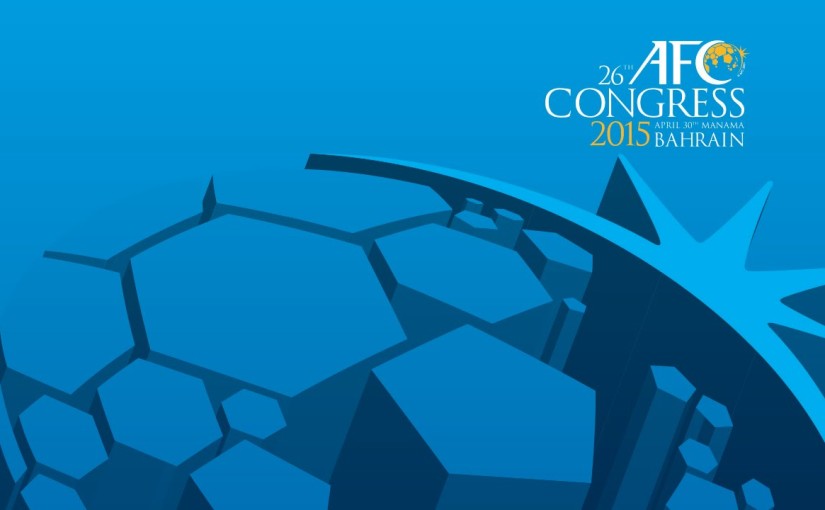By Andrew Warshaw in Manama, Bahrain
April 30 – Asia’s most influential sports official, Kuwait’s Sheikh Ahmad al Fahad Al Sabah, extended his burgeoning power base by joining FIFA’s inner sanctum today but the anticipated move into world football was not without controversy.
Sheikh Ahmad, honorary president of the Kuwaiti FA, is better known as head of the Association of National Committees (ANOC) and the Olympic Council of Asia (OCA) and will now form a powerful alliance with Asian Football Confederation president Sheikh Salman bin Ebrahim al Khalifa who was re-elected unopposed after taking over the reins in 2013.
Knowing Sheikh Ahmad only wanted a two-year position rather than four, the AFC hierarchy agreed to split the vote for the three available FIFA exco positions and change the statutes, a rare if not unprecedented constitutional move.
When it came to the ballot at the AFC Congress here, not everyone was happy with the way Sheikh Ahmad, who is believed to have an eye on the FIFA presidency in 2019, was catapulted into power.
Just before the vote, the head of South Korean football, Chung Mong Gyu, who was also standing for Fifa exco but was ultimately well beaten, asked to address delegates.
This is not uncommon at confederation congresses, in fact it is sometimes routine procedure. But Chung was declined permission to speak in spite of the fact that, unusually, there was no slot for ‘any other business’ on the agenda.
After a lengthy word in his ear from Salman, Chung returned to his seat.
“If anyone would like to make a statement, it has to be by written request,” Salman told his audience.
“We can open the floor and everybody can talk. If I allow Korea, we will have 10 or 20 other members who would like to talk. This will not get us anywhere.”
It was hardly the most democratic move on the day Salman was elected for another four years in his own backyard amid accusations he had helped orchestrate the change in statutes.
Sheikh Ahmed was joined on the FIFA executive committee by Prince Abdullah Sultan Ahmad Shah of Malaysia and Kohzo Tashima of Japan who will both serve for four years. Tashima polled 36 votes and Shah 25, the fall guy being the long-serving and controversial Worawi Makudi of Thailand, whose career in football administration, plagued by corruption allegations both at home and on the international stage, is now effectively over.
Makudi joined FIFA in 1997, one year before Sepp Blatter became president, and his defeat spells the departure of yet another figure caught up in the scandal that enveloped the 2018 and 2022 World Cup ballots handed to Russia and Qatar respectively.
Earlier when he opened Congress Sheikh Salman highlighted how much had been achieved in such a short space of time, referring to “the united Asia we are trying to build in football” and focussing on solidarity which he described as “one of the keys to our success.”
And in his closing remarks, he declared his confederation was now “closer than ever”.
“We may not always agree, after all we are 47 members in a very diverse continent but…we are a team and together we can be strong.”
Without any post-Congress press conference, reporters did not have the chance to question Salman on issues raised during the four-hour session, apart from those he had agreed to meet individually.
No-one can deny that in some areas progress has been made, not least the establishment of an AFC ethics committee (even though it has yet to show its teeth) and the development of the Asian Cup.
But unity and solidarity? Not yet.
Contact the writer of this story at moc.l1731671787labto1731671787ofdlr1731671787owedi1731671787sni@w1731671787ahsra1731671787w.wer1731671787dna1731671787


